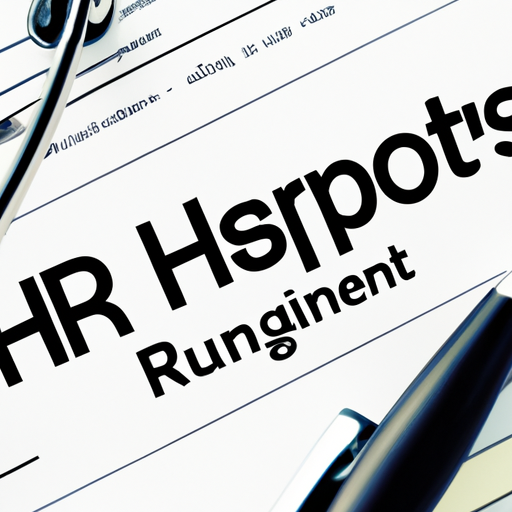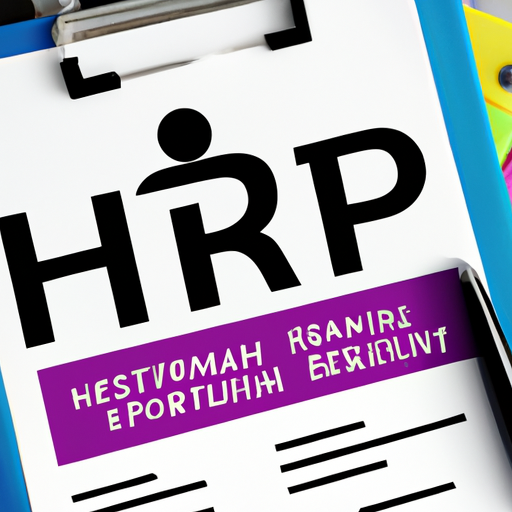The role of the HR Business Partner has become increasingly pivotal within organizations as they serve as the bridge between HR and business strategy. This article aims to provide a comprehensive overview of the HR Business Partner job description, responsibilities, and required skills. By understanding the breadth and depth of this role, both HR professionals and aspiring candidates can gain insights into the vital contribution an HR Business Partner makes in driving organizational success.
Table of Contents
- 1. Overview of the HR Business Partner Role in Modern Organizations
- 2. Essential Skills and Qualifications for Successful HR Business Partners
- 3. Key Responsibilities of an HR Business Partner: A Comprehensive Analysis
- 4. Establishing Strategic Partnerships: The Role of an HR Business Partner
- 5. Navigating HR Compliance and Employment Laws: Best Practices for HR Business Partners
- 6. Effective Talent Management Strategies: A Focus for HR Business Partners
- 7. Building Employee Engagement and Retention: Insights for HR Business Partners
- 8. Leveraging Data and Analytics: How HR Business Partners Drive Evidence-Based Decision Making
- 9. Transforming HR Practices: Recommendations for HR Business Partners in the Digital Age
- Key Takeaways

1. Overview of the HR Business Partner Role in Modern Organizations
The role of an HR Business Partner (HRBP) within modern organizations is vital in driving strategic business objectives and ensuring the smooth functioning of the human resources department. Spanning across various industries, the HRBP is responsible for aligning HR policies and practices with the overall goals of the organization, while also taking into account the needs and concerns of the employees.
As an HRBP, you will act as a trusted advisor to both the leadership team and employees, offering guidance on a wide range of HR matters. This includes but isn’t limited to talent acquisition and management, performance management, employee relations, compensation and benefits, workforce planning, and organizational development. By collaborating closely with stakeholders at all levels, the HRBP plays a key role in fostering a positive work culture and enhancing employee engagement, ultimately contributing to the overall success of the organization.

2. Essential Skills and Qualifications for Successful HR Business Partners
Hr Business Partner Job Description
When it comes to being a successful HR Business Partner, there are several essential skills and qualifications that one must possess. These skills help HR professionals effectively align human resources strategies with business objectives. Here are some key skills and qualifications that can contribute to a thriving career as an HR Business Partner:
- Strong Communication: As an HR Business Partner, effective communication is crucial. This includes not only the ability to express ideas clearly and concisely but also active listening skills to understand employee concerns and address them effectively.
- Strategic Thinking: HR Business Partners are responsible for identifying and implementing HR strategies that support the organization’s goals. Being able to think strategically and align HR initiatives with overall business objectives is essential for success in this role.
- Change Management: In today’s dynamic business environment, the ability to navigate and lead change is paramount. HR Business Partners must be skilled at managing and facilitating organizational change, ensuring smooth transitions and minimizing resistance within the workforce.
Furthermore, HR Business Partners should possess strong analytical and problem-solving abilities. These skills enable them to assess trends, gather data, and make informed decisions that contribute to organizational success. Additionally, having a comprehensive knowledge of employment laws and regulations is vital for ensuring compliance and mitigating legal risks. Overall, a successful HR Business Partner possesses a balance of interpersonal, strategic, and analytical skills, which are essential for creating a positive and engaging work environment.

3. Key Responsibilities of an HR Business Partner: A Comprehensive Analysis
Key Responsibilities of an HR Business Partner
As an HR business partner, your role encompasses various crucial responsibilities that are instrumental in driving the success of the organization’s human resources function. Here are some key areas that you will be accountable for:
1. Strategic HR Planning and Consultation:
- Collaborating with senior management to develop and execute HR strategies aligned with the company’s objectives.
- Providing expert advice and guidance to business leaders on human resources matters, leveraging your deep understanding of employment laws, industry best practices, and organizational policies.
- Contributing to talent management initiatives, including succession planning, workforce planning, and leadership development.
- Identifying opportunities for HR process improvements and implementing effective solutions to maximize efficiency and employee satisfaction.
2. Employee Relations and Engagement:
- Acting as a trusted partner to employees at all levels, fostering a positive and inclusive work environment.
- Managing employee relations issues, conducting investigations, and providing guidance on conflict resolution.
- Overseeing performance management processes, including goal setting, performance reviews, and career development plans.
- Championing employee engagement initiatives, such as employee surveys, recognition programs, and fostering a strong company culture.
In addition to these core responsibilities, as an HR business partner, you will continuously collaborate with stakeholders across departments to build and maintain strong relationships, facilitate talent acquisition and retention efforts, and ensure compliance with labor laws and regulations. Your expertise will enable you to provide strategic support, drive organizational effectiveness, and contribute to the overall growth and success of the business.
4. Establishing Strategic Partnerships: The Role of an HR Business Partner
Responsibilities:
An HR Business Partner plays a crucial role in establishing strategic partnerships within an organization. This entails collaborating with various departments and leadership to identify the long-term goals of the business and aligning human resources strategies with those objectives. Here are some key responsibilities of an HR Business Partner:
- Developing and implementing HR strategies and initiatives that support the overall business goals
- Acting as a trusted advisor to senior managers and executives, providing guidance on HR matters and offering solutions to resolve complex business challenges
- Managing employee relations, ensuring fair and consistent application of policies and procedures, and fostering a positive work environment
- Partnering with hiring managers to attract, recruit, and retain top talent, utilizing innovative sourcing strategies and effective selection techniques
- Designing and delivering training programs to enhance employee skills and knowledge, driving continuous development and growth
- Evaluating HR metrics and analytics to identify areas for improvement and implementing strategies to enhance overall organizational performance
Qualifications:
Being an effective HR Business Partner requires a unique blend of skills and qualifications. Here are some qualifications typically sought after in this role:
- Bachelor’s degree in Human Resources, Business Administration, or a related field; advanced degree preferred
- Proven experience as an HR Business Partner or in a similar HR leadership role
- Strong understanding of HR best practices, legal compliance, and industry trends
- Exceptional communication and interpersonal skills, with the ability to build relationships at all levels of the organization
- Demonstrated ability to think strategically, make sound decisions, and manage multiple priorities in a fast-paced environment
- Experience with HR systems and technology, data analysis, and reporting
- HR certifications such as PHR or SHRM-CP are highly desirable
5. Navigating HR Compliance and Employment Laws: Best Practices for HR Business Partners
In the fast-paced and ever-changing world of HR, it is crucial for HR Business Partners to navigate through the complex landscape of HR compliance and employment laws. As key players in their organizations, HR Business Partners must maintain a thorough understanding of the legal framework surrounding employment practices. This includes staying up-to-date with federal, state, and local regulations, as well as any industry-specific requirements that apply to their organization.
Best practices for HR Business Partners in navigating HR compliance and employment laws involve:
- Continuous Education: HR Business Partners should actively seek opportunities to expand their knowledge and stay informed about the latest developments in HR compliance and employment laws. This can be achieved through attending seminars, workshops, and webinars, as well as staying connected with professional HR networks.
- Proactive Risk Assessment: By conducting regular risk assessments, HR Business Partners can identify potential compliance gaps that may exist within their organization. This includes reviewing HR policies, procedures, and practices to ensure they align with applicable laws and regulations.
- Effective Communication: Collaboration and open communication between HR Business Partners and other departments, such as Legal and Finance, is essential. This ensures a cohesive approach to HR compliance, as well as the development and implementation of appropriate policies and procedures.
By adhering to these best practices, HR Business Partners can effectively navigate the complex world of HR compliance and employment laws, protecting their organization from potential legal risks and fostering a workplace environment that is fair, equitable, and in compliance with the law.
6. Effective Talent Management Strategies: A Focus for HR Business Partners
In the rapidly evolving employment landscape, organizations are realizing the significance of effective talent management strategies to drive organizational success. HR Business Partners play a crucial role in implementing these strategies, ensuring that the right talent is recruited, retained, and developed within the organization. By aligning talent management with business objectives, HR Business Partners become strategic partners in driving growth and performance.
One key strategy for HR Business Partners is to conduct comprehensive talent assessments. This involves assessing the current workforce’s skills, competencies, and potential for growth. By identifying skills gaps and potential leaders, HR Business Partners can develop targeted training and development programs to bridge these gaps and nurture internal talent. Moreover, establishing a structured succession planning process ensures a smooth transition during periods of leadership changes, minimizing any disruptions to business operations.
7. Building Employee Engagement and Retention: Insights for HR Business Partners
Key Responsibilities:
- Develop and implement strategies to enhance employee engagement and retention throughout the organization.
- Collaborate with senior management to identify areas for improvement and implement effective HR initiatives.
- Assess and address employee needs, concerns, and aspirations to proactively develop action plans and foster a positive work environment.
- Design and deliver training programs that enhance employees’ skills, productivity, and job satisfaction.
- Partner with HR colleagues to create and implement comprehensive employee development programs and career pathways.
Qualifications and Skills:
- Bachelor’s degree in human resources, business administration, or a related field.
- Proven experience as an HR Business Partner or in a similar role.
- Extensive knowledge of employee engagement strategies and best practices.
- Excellent analytical and problem-solving skills.
- Strong interpersonal and communication skills to effectively engage with employees at all levels of the organization.
- Ability to collaborate and influence stakeholders to drive positive change.
8. Leveraging Data and Analytics: How HR Business Partners Drive Evidence-Based Decision Making
Driving Data-Driven HR Strategies:
In today’s rapidly evolving business landscape, data has become a valuable tool for HR professionals to make informed decisions. As an HR business partner, one of your core responsibilities is to leverage data and analytics to drive evidence-based decision making. By utilizing data, you can identify trends, patterns, and gaps within your organization, allowing you to develop targeted strategies that align with the company’s goals and objectives.
- Access and analyze HR metrics: Uncover key insights by collecting and analyzing HR data such as employee turnover rates, recruitment effectiveness, and employee engagement levels. With this information, you can identify areas of improvement and develop tailored solutions to enhance organizational performance.
- Implement predictive analytics: By utilizing predictive analytics, you can anticipate future trends and challenges, allowing you to proactively develop strategies to mitigate risks and capitalize on opportunities. This enables you to stay ahead of the game and make strategic decisions that positively impact the organization.
Enhancing Decision Making:
Evidence-based decision making is an essential skill for HR business partners to possess. By combining your expertise in HR with data-driven insights, you can provide valuable recommendations to senior leadership and influence the direction of the organization. Here are some key ways HR business partners enhance decision making:
- Identify performance gaps: By analyzing performance data, you can pinpoint areas where employees may require additional training or development. This allows you to create targeted programs that improve performance and enhance employee satisfaction.
- Monitor workforce diversity and inclusion: With the help of data, you can track diversity and inclusion metrics to ensure representation and fairness across the organization. By identifying any gaps and implementing strategies, you can cultivate an inclusive environment that fosters innovation and productivity.
By leveraging data and analytics, HR business partners play a crucial role in driving evidence-based decision making. By utilizing these tools effectively, you can contribute to the success and growth of your organization, while also ensuring the well-being and satisfaction of its employees.
9. Transforming HR Practices: Recommendations for HR Business Partners in the Digital Age
Hr business partner job description
As businesses continue to evolve in the digital age, the role of HR business partners has become increasingly vital. These professionals play a critical role in transforming HR practices to meet the new demands of the digital era. To thrive in this ever-changing landscape, HR business partners must embrace new technologies, leverage data-driven insights, and foster a culture of continuous innovation within their organizations.
Here are some key recommendations for HR business partners in the digital age:
- Embrace technology: HR business partners should stay updated with the latest HR technology trends and tools, such as applicant tracking systems, employee engagement platforms, and data analytics software. By leveraging these technologies, they can streamline HR processes, enhance efficiency, and provide data-driven recommendations.
- Develop data-driven insights: In the digital age, HR business partners have access to vast amounts of data. By analyzing this data, they can uncover valuable insights that can inform decision-making, improve talent acquisition and retention strategies, and enhance overall organizational performance.
- Encourage innovation: HR business partners can drive innovation within their organizations by fostering a culture of creativity and continuous learning. They should promote collaboration, provide development opportunities, and encourage employees to embrace new technologies and ways of working.
- Elevate the employee experience: In the digital age, HR business partners must pay special attention to the employee experience. By understanding the unique needs and expectations of their workforce, they can design personalized HR programs, implement flexible work arrangements, and create a positive and inclusive work environment.
- Collaborate cross-functionally: HR business partners should establish strong partnerships with leaders from other functions and departments. By collaborating across teams, they can align HR initiatives with overall business goals, leverage synergies, and drive organizational success.
- Stay adaptable: With rapid technological advancements, the digital landscape is ever-changing. HR business partners must embrace a mindset of continuous learning and adaptation. They should proactively seek opportunities to enhance their skills, stay updated with industry trends, and be agile in responding to evolving business needs.
Key Takeaways
In conclusion, the role of an HR business partner is crucial in driving organizational success through effective people management strategies. This comprehensive job description outlines the diverse responsibilities and skill set required to excel in this position. By collaborating with key stakeholders and aligning HR practices with business objectives, HR business partners play a pivotal role in fostering a positive work environment, enhancing employee engagement, and facilitating growth within an organization. Moreover, their expertise in areas such as talent acquisition, employee development, and performance management ensures the implementation of best practices and compliance with relevant employment laws. As a trusted advisor and strategic partner, an HR business partner acts as a bridge between management and employees, promoting transparency, communication, and fairness in all HR-related matters. Ultimately, the success of an organization lies in the hands of its employees, and an effective HR business partner is instrumental in cultivating a motivated workforce that drives sustainable business growth.
